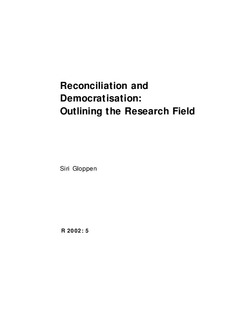Reconciliation and Democratisation: Outlining the Research Field
| dc.contributor.author | Gloppen, Siri | |
| dc.date.accessioned | 2008-02-25T12:42:50Z | |
| dc.date.accessioned | 2017-03-29T09:12:17Z | |
| dc.date.available | 2008-02-25T12:42:50Z | |
| dc.date.available | 2017-03-29T09:12:17Z | |
| dc.date.issued | 2002 | |
| dc.identifier.isbn | 82-8062-011-7 | |
| dc.identifier.issn | 0805-505X | |
| dc.identifier.uri | http://hdl.handle.net/11250/2435792 | |
| dc.description.abstract | The report presents an overview of institutional strategies to deal with the problem of past atrocities – trials, purges, truth commissions, restorative efforts, reforms, amnesty and amnesia. It discusses the main debates and dilemmas raised by these efforts, as reflected in the transitional justice literature. A central lesson drawn is that local ownership and legitimacy for the process is crucial for reconciliation to result. This, in turn, is to a large extent a function of the process through which the transitional justice institutions are established. It is in other words, not only a matter of what is done and when, but how and by whom. | |
| dc.language.iso | eng | |
| dc.publisher | Chr. Michelsen Institute | |
| dc.relation.ispartofseries | Research report | |
| dc.relation.ispartofseries | R 2002: 5 | |
| dc.subject | Democratisation | |
| dc.subject | Transition justice | |
| dc.subject | Truth commissions | |
| dc.subject | War crimes | |
| dc.subject | Peace-building | |
| dc.subject | United Nations | |
| dc.subject | South Africa | |
| dc.title | Reconciliation and Democratisation: Outlining the Research Field | |
| dc.type | Research report |
Tilhørende fil(er)
Denne innførselen finnes i følgende samling(er)
-
Bora-import [434]
